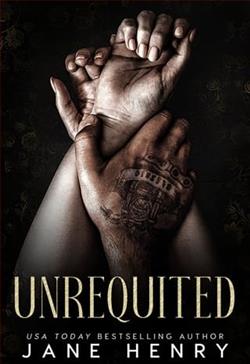Page 204 of The Daughters of Avalon
Seren laughed softly. It was true. King Stephen had none at all. For the entire first year of his reign, he’d made some sore attempt to annex those lands, but it soon became quite apparent that the Welsh lords would never cede their lands or their kingships without a fight—one Stephen could ill afford, particularly when David was already seizing lands to the north, and Matilda was trying to rouse barons against him. But such was the power of destiny and theysbryd y byd –the spirit of the age.
“At my mother’s behest, my grandmamau appealed to Henry, so Henry agreed to allow her to keep Blackwood for her heirs, if only if she swore allegiance to him, not to Gruffydd ap Rhys, and only if my mother agreed to become a ward of his court. Later, when my grandmamau died, our lands were again forfeit, only this time to Henry.”
“So, in reality, you came into this world as Henry’s prisoner?”
Seren frowned over that plainspoken truth. “I suppose ’tis one way to look at it.” Along with her mother, and her sisters, they were, indeed, all wards of her father’s court. Still, Elspeth was indisputably Henry’s favorite, even above his heirs—though not William, of course. William was always Henry’s hope of hopes, and when he died, a part of her father died as well. He never quite took to Matilda. “I should say, we were far freer wandering my father’s halls than we ever were at the priory.”
“I see,” he said.
And yet he couldn’t see—not everything.
What would he think if he knew her mother had sent that mist to cripple the White Ship? Aye, it was true. It happenedmany, many moons before Seren was born, but Morwen oft bragged of the deed. In the blink of an eye, an entire generation was lost, and there were many who claimed it was the sinking of that vessel that doomed England to this anarchy. But Seren knew better. Rather, the cause of their woes was a greedy witch.
What more proof did they need?
With malice and forethought, her mother had sunk the White Ship, consigning their father’s heir to the cold, black depths of the sea. Seren and her sisters also suspected that Stephen was privy to this treachery, and that, moreover, Morwen advised him to disembark the White Ship—which he did, of course, feigning some bellyache. He took another ship, sailing safely to England whilst so many of his cousins perished. And, if that were not tragedy enough, Morwen had murdered the man she’d claimed to love—the father of her daughters. And all the while she’d been poisoning Henry with potions, she’d been whispering venomous words into his nephew’s ear, until Stephen of Blois was well-primed to steal his uncle’s throne. Now she was poised to drive another king mad and replace him with a true despot, someone who took glee in the burning of castles and shedding of blood. Eustace, Count of Mortain, now Blois, was the worst thing that could happen to England, aside from her mother. Put the two of them together, and this would be England’s doom.
Wilhelm moved ahead, whacking at another tangle of vines, and Seren fell silent, contemplating the day’s news.
What did this mean for Elspeth? What could it mean for Warkworth? How did a siege at York fare for those remaining in the borderlands?
Gods forbid, what if David did, indeed, manage to take York? Warkworth would be left well north of David’s southernmost lands. Would Giles be compelled to bend the knee to David? Would the Church intervene? And, if, in truth, it came to all-out war, would Matilda join her son at York?
She swallowed hard, thinking about Wilhelm.
He was made for war, and something about his demeanor gave her every impression he would be good at his job. His wide shoulders gave testament to a lifetime of training. But that scar on his face… it bespoke his vulnerability. How could she ever bear it if anything happened to her gentle giant?
She glanced at the sweet, beautiful man riding beside her, guarding her so jealously. When all was said and done, what would come of their affiliation? Was any sort of alliance between them even remotely possible?
She’d come to know him so well by now that she didn’t like to think of parting ways. But, alas, Wilhelm Fitz Richard was only a bastard—as was she, though unlike Seren, he did not bear the blood of kings in his veins. Wilhelm probably feared he could not provide for her; little did he realize that she and her sisters had lived most of their lives in abject poverty, working hard for every morsel, and returning by night to a cottage with only a crude dirt floor. They shared a single bed together, and no one complained. If, in truth, he could wish her to be his bride, Seren believed she could be happy as the helpmate of a simple man.
Her belly fluttered over the shocking turn of her thoughts.
If Matilda or Henry should recover England, perhaps they would release her dowry? And, if they released her dowry, mayhapshecould provide for Wilhelm? It was a fanciful notion, perhaps, but not entirely unreasonable. Amidst the Welsh people, there were many women who married simpler men, particularly in the case of an heiress. Since only men could inherit lands, a wealthy woman could, indeed, marry for love. Nor was every match made for gain.
Alas… what made her think Wilhelm had any desire for her at all? Even now his aura confused her.
Get yourself together, Seren. He is not for you, and neither must you win yourself a champion only because Rose and Ellie found one.Not every man desires you.
You’re a witch,she chided herself. At least so far as most folks were concerned. No sane man would willingly tangle with Morwen Pendragon over any of her daughters, no matter how fair their countenance—and particularly not a man whose welfare depended upon the good will of his lord and brother.
Turn your heart, Seren.
Turn your heart from this folly, before ’tis too late.
And yet, she knew… she would defy reason to follow her heart. Only realizing how much she’d kept locked inside, she vowed to never again betray herself. And even as she thought it, herwitchwindstirred yet again…
A breeze rifled the tree tops, scattering a host of sparrows from their perches. Poplar leaves tinkled in warning.
It wasn’tlong after Lady Aldergh departed that Cora ascended the stairwell to check on the babes. She scolded her daughter for not having informed her at once that the mistress was leaving. Ellyn was not herself today. Only yesterday that girl would have wept blood-tears for having distressed her mother. Today… she seemed distracted.
It must be a boy, Cora reasoned. Ellyn was getting to be that age—sixteen, and more a woman than she would like to believe. With those lovely blue eyes and golden hair, she was naught at all like her father nor her mother. Cora herself was fair of skin, and pretty enough in her youth, but her hair was red, and her eyes, though blue, were never so bright as Ellyn’s. Her daughter would make some good man a fine wife someday, and, shethought perhaps their mistress already had someone in mind—one of Lord Malcom’s men-at-arms.
Thinking about that—about grandbabes bouncing on her own knee—she entered the nursery, feeling ill at ease. The air in the chamber felt strained. One of the babes lay whimpering, and she felt ashamed for leaving them so long unattended. “Ellyn,” she railed. Her daughter was supposed to have traded her shift with another maid. These children were never to be left unattend?—
Her heart flipped as she peered into the cradle. Swallowing a lump of bile that rose to strangle her, she stared in horror into the cradle. There was onlyonechild here. Only wee Lachlan’s anguished blue eyes peered up at her, his gaze entirely too knowing for a babe so young. But nay! Why would Elspeth take only one child, not the other?
Her heart pummeling her ribs in fear, she lifted Lachlan, and with the child in her arms, she bolted from the room into the hall. “Ellyn,” she screamed. “Ellyn!” And then, sensing something terrible, she shouted for her steward husband. “Alwin!”















